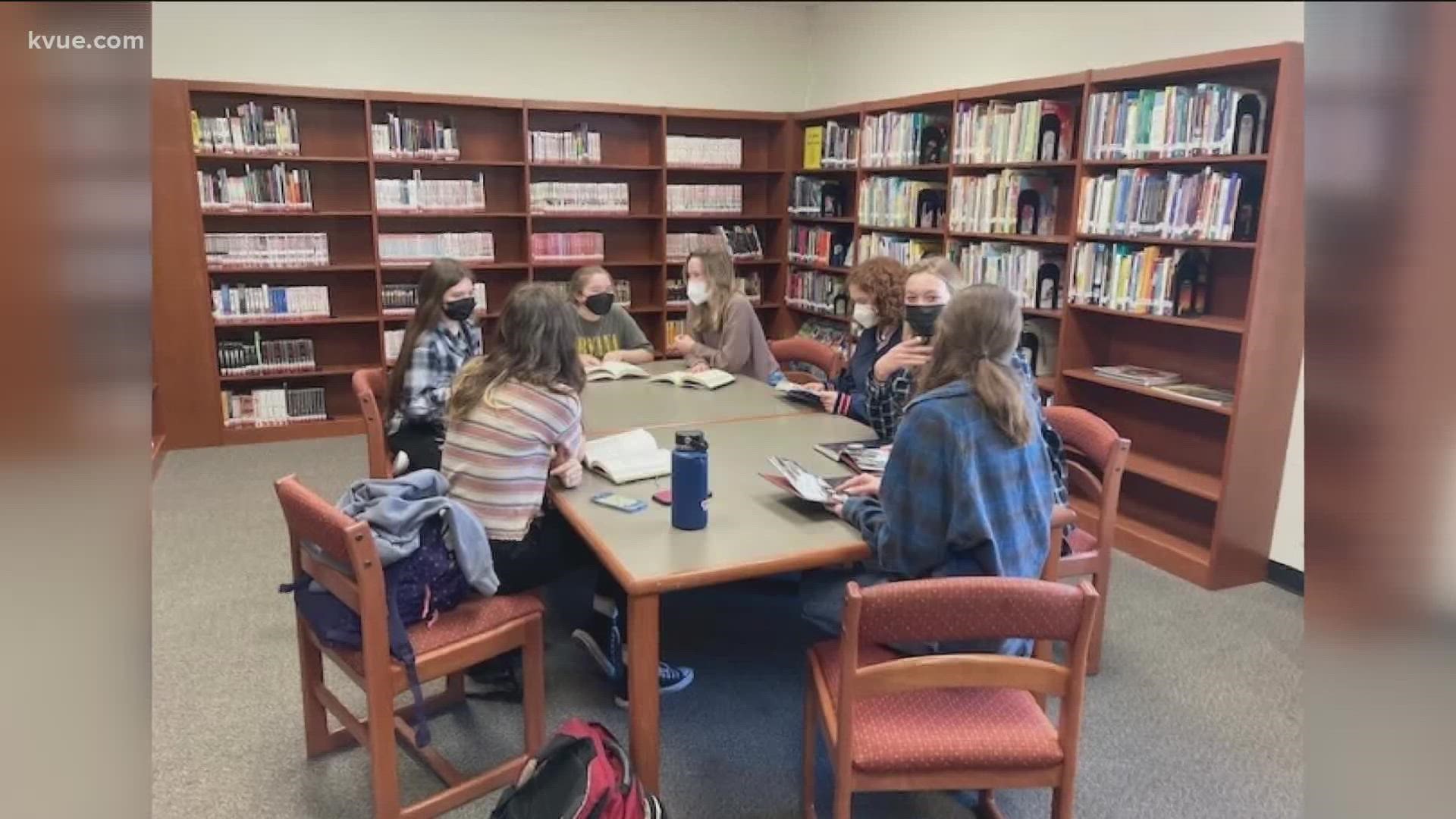AUSTIN, Texas — Sophomores Ella Scott and Alyssa Hoy run the Vandegrift High School Banned Book Club.
"We kind of just like saw all the book censorship that was happening in the classrooms that applied to what we were reading, and we were just really interested in learning more about that and getting students involved in that process," 15-year-old Scott said.
Scott and Hoy launched the club at the beginning of the school year, including a coinciding Instagram account, but had started planning the idea at the end of the 2020-2021 school year.
"We were looking at the list of the books that they banned and we were scrolling through it and it was so long," Scott said. "We had read, like, most of those books. We're like, 'I love that book and I love that book too.' And they were all on the list, and we had no idea that the list was even made for the longest time."
Leander ISD released a new list of books banned from classroom libraries and book club reading lists in the fall. The VHS Banned Book Club has started reading books from the new list.
RELATED: 11 books removed from Leander ISD book club, classroom libraries; still available on campuses
So far, about a dozen students from different grade levels get together for 30 minutes every two weeks during a study hall period at VHS. They discuss the book they're reading. The members are in the middle of "Out of Darkness" by Ashley Hope Perez, discussing why it was banned and why it should or shouldn't be banned.
"We have successfully gotten 'Kiss Number 8' added back to the library," Kendall Howe, also a sophomore and the club officer who creates the biweekly discussion questions, said. "To find like the value and power in a book, I think it mostly comes from the emotions and the reaction that you have from reading the book."
Howe's questions typically center around discussing when readers feel their most energized reactions.
Through this club, Scott and Hoy want students to have a greater voice in what books are reviewed and deemed appropriate for high school students.
"No one's book taste is quite the same, so I think that having a wide variety of all these different books is really important," Hoy said. "Sometimes reading a book and finding themselves within the pages of that book is really important."
Hoy believes all the books that came under review within Leander ISD the past year should be available for students to read, that the possibility of reading these books should be left up to students on an individual basis.
"If students want to read these books, they should be allowed to read these books, and if they don't, they don't have to read them," Hoy said. "They should just be available to them, to someone if they want them. And I think with the, you know, restriction of some of these books … I feel like student perspective isn't really being asked when they make these decisions. I feel like it isn't happening with students in the conversation."
According to Leander ISD, students can take part in the CCAC reviews whenever reading materials are challenged. But, according to a spokesperson for the district, some students agree to an annual commitment. This year, seven students are part of CCAC. Each CCAC has students, parents, teachers and community members as part of the committee.
Late last year, Williamson County Commissioners and Leander ISD leadership exchanged emails regarding CARES Act funding. The Commissioners Court initially threatened to withhold CARES Act reimbursements earmarked for the district because of LISD's review process. In the end, commissioners said as long as LISD's process has greater transparency, the district would receive the money.
Teachers, parents and authors initially took this as a sign the Commissioners Court would withhold funding unless more books available to students were found inappropriate. A spokesperson for Williamson County said commissioners declined an interview for this story because how people interpreted commissioners' actions "was not the intention."
In the fall of 2021, State Rep. Matt Krause (R-Fort Worth) released a list of 850 books he wanted to see get reviewed by school and district leaders across the state, arguing they may be inappropriate for students. The list and announcement ignited investigations across Texas into what books were made available to students.
According to LISD, none of the books that students in the VHS Banned Book Club are reading are available through classroom libraries. Students can find the books in school and district libraries, or obtain them on their own.
"Because we're kids in high school, we think it's important to have the kids around us have like a chance to speak, and we're going to be the ones that help them get their voices out for it," Howe said.
PEOPLE ARE ALSO READING:

